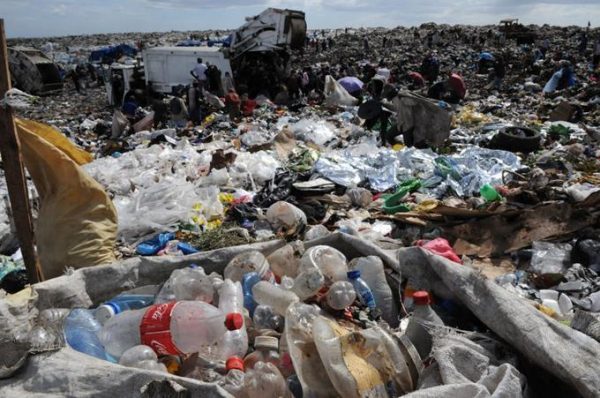
A dozen Caribbean countries recently announced their adhesion to the United Nations initiative for the elimination of single-use plastic and polystyrene foam products to prevent further environmental degradation. The DR was not one of them.
On the contrary, the director of the Solid Waste Department of the Ministry of Environment, Francisco Flores Chan, said he does not agree. He argues the countries that have announced the elimination of single-use plastic do not manufacture plastics. “We have 500,000 jobs in the plastics chain alone, because we have plastic bottles for soft drinks, medicines, food, kitchen utensils and almost everything is made from plastic,” Flores Chan said during an interview at his offices at the Duquesa garbage dump.
When asked if he defends plastics, he said “to the letter” and said that almost all the things people use are made of plastic. “What isn’t plastic? The plane you get on that you’re on, and the clothes you’re wearing, everything is plastic, there would be no electricity if there was no plastic,” he said.
He downplayed the importance of the small recycling programs that are carried out in the country indicating that “with that nothing is done, do you know why? Because 5,000 billion plastic bags are produced worldwide and there is no substitute for them at the moment.”
Flores Chan said that the government sector must be attentive to the global technological movements and adapt the regulations to the development of new technology that is increasingly more in line with the environment. He also advocated for the establishment of rules for the entry of materials that are in line with the environment through customs and to encourage public and private companies and traders to use eco-friendly materials.
He concludes that the inadequate handling of plastics must be changed by creating the necessary regulations, educating people so that they become aware of the need to make better use and handling of plastics and garbage in general, getting city councils to take responsibility to offer a good garbage collection service, and getting companies to act with greater responsibility towards the containers they introduce into the market.
Meanwhile, Rafael Encarnación, in charge of environmental management at the Santo Domingo East municipality, says that the country has an obligation to comply with international obligations, especially Agenda 2030. He said that the Solid Wastes Bill has not been approved in Congress because it affects private interests. Encarnación said that 508 million pounds of plastics enter the country each year, not adding single-use plastics such as foam.
A World Bank reports indicates that litter found in coastal cleanups in the Dominican Republic is second only to Jamaica in the Caribbean. The litter concentration (items/km) in Jamaica is 4,684 compared to 3,966 in Dominican Republic, 3,904 in Guyana and 2,435 in St. Vincent and the Grenadines. The Caribbean average is 2,014. Jamaica has enacted the ban. Yet the DR, Haiti and Trinidad & Tobago are increasingly looking alone on single-use plastics in the Caribbean.
The report indicates that about 85% of wastewater in the wider Caribbean region goes untreated into the ocean, and 52% of households in the insular Caribbean—comprising The Bahamas, the Greater Antilles (Cuba, Dominican Republic, Haiti, Jamaica, and Puerto Rico); and the small islands of the Lesser Antilles—lack sewer connections. More than 320,000 tons of plastic waste remains uncollected each year. Some 22% of households dispose of waste in waterways or on land where it can be washed into waterways.
The highest concentration of beach litter was found in on the shores of Jamaica, where 36% of households do not have waste-collection services. The second highest concentration was in the Dominican Republic, where 25% of households don’t enjoy those services, according to the Marine Pollution report. The World Bank report data is sourced from Ocean Conservancy 2017.
Read more:
Listin Diario
Green Matters
World Bank
Forbes
15 January 2020

